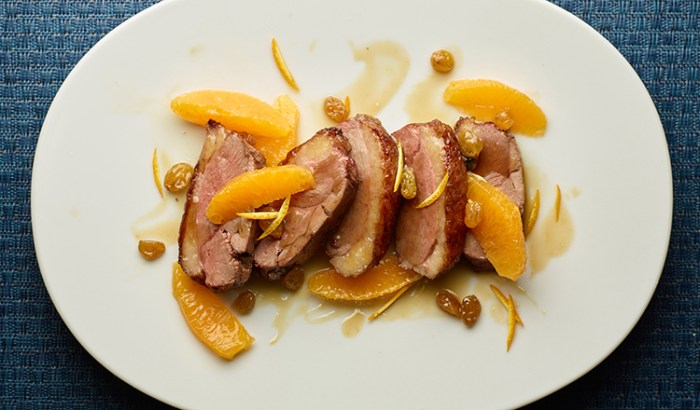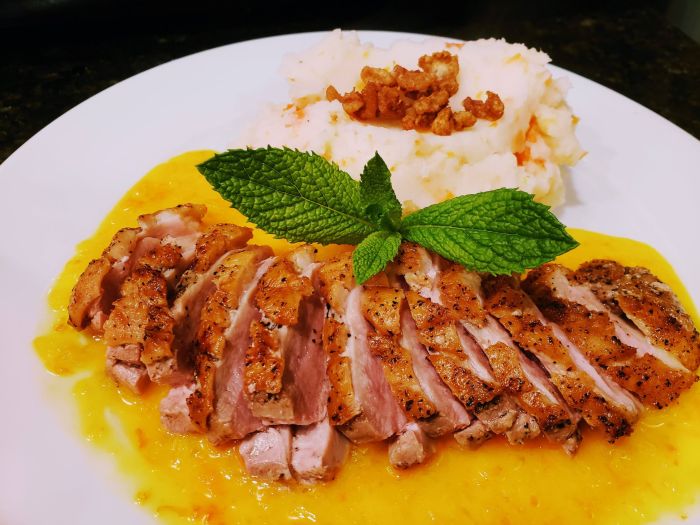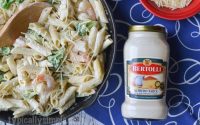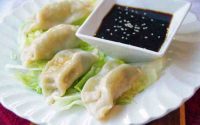Duck LOrange Sauce Recipe A Culinary Guide
Duck l’Orange Sauce: A Culinary Exploration
Duck l’orange sauce recipe – Duck l’Orange, a classic French dish, offers a delightful balance of rich duck meat and a vibrant, sweet-and-tart orange sauce. This exploration delves into the recipe’s versatility, ingredient nuances, preparation techniques, and serving suggestions, aiming to provide a comprehensive understanding of this culinary masterpiece.
Recipe Variations, Duck l’orange sauce recipe

Source: ciafoodies.com
The Duck l’Orange sauce recipe can be adapted to suit various cooking preferences and equipment. Below are three variations, each showcasing a different cooking method and highlighting the unique characteristics it imparts.
| Method | Ingredients | Steps | Serving Suggestions |
|---|---|---|---|
| Stovetop | Duck breasts, orange juice, orange zest, butter, shallots, red wine, chicken broth, sugar, salt, pepper | Sear duck breasts, deglaze pan with wine, add shallots and simmer, reduce sauce, whisk in butter, add orange juice and zest. | Serve with roasted root vegetables and wild rice. |
| Oven | Duck breasts, orange juice, orange zest, honey, soy sauce, garlic, thyme, salt, pepper | Score duck skin, roast in oven until crispy, deglaze pan with orange juice, honey, and soy sauce. Reduce sauce, add garlic and thyme. | Pair with creamy polenta and sautéed asparagus. |
| Slow Cooker | Duck breasts, orange juice, orange zest, brown sugar, Dijon mustard, ginger, garlic, salt, pepper | Sear duck breasts, place in slow cooker with remaining ingredients, cook on low for 6-8 hours. Thicken sauce before serving. | Serve over mashed sweet potatoes with a side of green beans. |
Stovetop methods yield a quicker, more intensely flavored sauce, while oven roasting produces crispier duck skin. The slow cooker variation offers a tender, fall-off-the-bone texture. The texture of the duck meat varies from crispy skin and tender meat (stovetop and oven) to incredibly tender meat (slow cooker).
Sauce Composition
The signature flavor of Duck l’Orange sauce hinges on a delicate balance of sweet, tart, and rich elements. Understanding the role of each ingredient is key to replicating its unique character.
- Orange Juice & Zest: Provide the characteristic citrusy tang and aromatic notes.
- Sugar/Honey: Contributes sweetness to balance the acidity of the orange juice.
- Butter/Red Wine: Adds richness and depth of flavor, creating a luxurious mouthfeel.
- Shallots/Garlic: Provide savory undertones and enhance the overall complexity.
- Stock/Broth: Adds body and helps to create a smooth, cohesive sauce.
Substitutions can be made, but with potential impact on the overall flavor profile:
- Orange Juice: Grapefruit juice offers a similar tartness, but with a more bitter edge. Mandarin juice provides a milder, sweeter alternative.
- Sugar/Honey: Maple syrup offers a deeper, more complex sweetness. Agave nectar provides a slightly more subtle sweetness.
- Butter: Olive oil provides a lighter, fruitier flavor. Coconut oil adds a distinct tropical note.
- Shallots/Garlic: Scallions provide a milder onion flavor. Ginger adds a spicy warmth.
- Stock/Broth: White wine can be substituted for a more pronounced alcoholic note. Vegetable broth provides a vegetarian option.
Duck Preparation

Source: sweetzivile.com
Proper duck preparation is crucial for achieving optimal flavor and texture. Scoring the skin allows for even cooking and crispiness, while rendering the fat enhances the richness of the meat.
- Begin by scoring the duck breast skin in a crosshatch pattern, being careful not to cut into the flesh. The duck breast, scored in a crosshatch pattern, reveals glistening skin ready for searing.
- Season the duck breasts generously with salt and pepper. This enhances the flavor and helps to create a crispy skin.
- Sear the duck breasts skin-side down in a hot pan until the skin is golden brown and crispy. This process renders the fat and adds a delightful crunch.
- Flip the duck breasts and cook to your desired level of doneness. Use a meat thermometer to ensure the internal temperature reaches a safe level.
- Allow the duck breasts to rest for a few minutes before slicing. This allows the juices to redistribute, resulting in more tender and flavorful meat.
Serving Suggestions
Duck l’Orange pairs beautifully with a variety of side dishes and beverages. The following suggestions offer a range of flavor profiles and textures to complement the richness of the dish.
| Dish | Description | Pairing Rationale | Preparation Notes |
|---|---|---|---|
| Wild Rice Pilaf | Nutty and earthy wild rice pilaf with herbs and toasted nuts. | Provides textural contrast and complements the richness of the duck. | Cook according to package directions, adding herbs and nuts during the last few minutes of cooking. |
| Roasted Root Vegetables | Sweet and savory roasted carrots, parsnips, and potatoes. | The sweetness of the vegetables balances the tartness of the sauce. | Toss vegetables with olive oil, herbs, and salt and pepper before roasting. |
| Sautéed Asparagus | Simple yet elegant sautéed asparagus with lemon juice and butter. | Adds a touch of freshness and brightness to the plate. | Sauté asparagus until tender-crisp, season with lemon juice, salt, and pepper. |
| Creamy Polenta | Smooth and creamy polenta with parmesan cheese. | The creamy texture contrasts nicely with the crispy duck skin. | Cook polenta according to package directions, stir in parmesan cheese before serving. |
| Mashed Sweet Potatoes | Sweet and buttery mashed sweet potatoes with cinnamon and nutmeg. | The sweetness of the sweet potatoes complements the richness of the duck. | Boil sweet potatoes until tender, mash with butter, cinnamon, and nutmeg. |
Pinot Noir or a Gewürztraminer are excellent wine pairings; their fruity notes and acidity cut through the richness of the duck and sauce.
For elegant plating, arrange the sliced duck breast on a bed of the chosen side dish, drizzle generously with the sauce, and garnish with fresh orange zest or a sprig of thyme.
Troubleshooting Common Issues
While Duck l’Orange is a relatively straightforward dish, a few common problems can arise. Understanding the causes and solutions will help you achieve consistent success.
- Overly Greasy Sauce: This often results from insufficient rendering of the duck fat. Solution: Ensure proper rendering of the fat before adding other ingredients to the sauce. Skim off excess fat from the surface of the sauce before serving.
- Undercooked Duck: This indicates inadequate cooking time or temperature. Solution: Use a meat thermometer to ensure the duck reaches the desired internal temperature. Adjust cooking time as needed.
- Sauce That Is Too Tart: This suggests an imbalance of sweet and tart flavors. Solution: Add more sugar or honey to balance the acidity of the orange juice. Taste and adjust as needed.
Historical Context
The precise origins of Duck l’Orange are debated, but it’s widely believed to have evolved from various French culinary traditions. Regional variations exist, with some recipes incorporating additional spices or herbs. The dish’s popularity has spread globally, with adaptations appearing in various cuisines.
The rich, citrusy flavor of duck l’orange sauce is a delightful contrast to the savory duck. Interestingly, the balance of sweet and tart is reminiscent of some excellent dipping sauces; for instance, consider the vibrant flavors found in a dipping sauce recipe for fried shrimp. This similarity highlights the versatility of flavor profiles, and ultimately informs the creation of a well-rounded duck l’orange sauce.
While definitive historical accounts are scarce, anecdotal evidence suggests that the dish’s popularity rose alongside the increased availability of citrus fruits in Europe, becoming a staple in upscale French restaurants by the 19th century. Its enduring appeal lies in its exquisite balance of flavors and textures, making it a timeless culinary classic.
FAQ Corner: Duck L’orange Sauce Recipe
Can I use frozen duck breasts?
Yes, but ensure they are completely thawed and patted dry before cooking to achieve optimal browning and crisp skin.
What if my sauce is too tart?
Add a teaspoon or two of sugar or honey to balance the acidity. You can also add a splash of orange liqueur for added sweetness and complexity.
How can I prevent a greasy sauce?
Ensure you properly render the duck fat before adding the other sauce ingredients. Skim off excess fat from the surface of the sauce during cooking.
What wine pairs best with duck l’orange?
A Pinot Noir or a lighter-bodied red wine complements the richness of the duck and the bright citrus notes of the sauce.
Can I make the sauce ahead of time?
Yes, the sauce can be made a day in advance and reheated gently before serving. This allows the flavors to meld beautifully.



